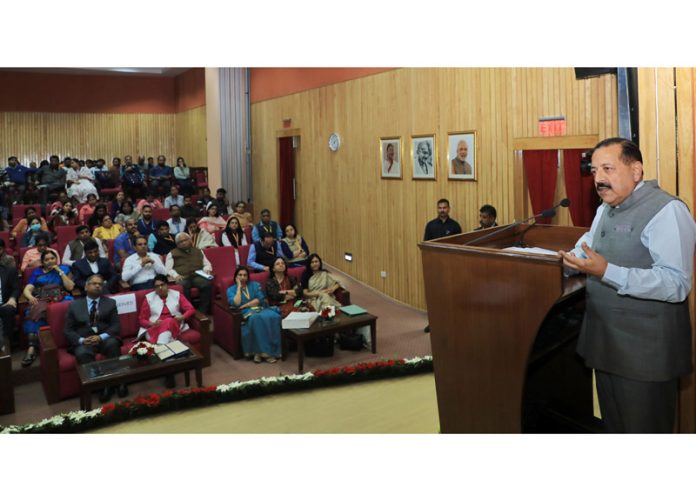
Excelsior Correspondent
NEW DELHI, Nov 20 : In a groundbreaking step for India’s biotechnology sector, Union Minister Dr. Jitendra Singh today formally launched the first indigenous antibiotic “Nafithromycin” for resistant infections.
It is only after 2014, when Prime Minister Narendra Modi took over that our researchers received the right kind of support to explore their potential, said Dr Jitendra Singh and added that Modi’s personal intervention has made the task far easier now.
The antibiotic “Nafithromycin” has been developed with the support of “Biotechnology Industry Research Assistance Council” (BIRAC), a unit of the Department of Biotechnology and has been brought to market under the trade name “Miqnaf” by pharma company “Wolkardt”. It is the country’s first indigenously developed antibiotic aimed at tackling Antimicrobial Resistance (AMR).
This innovation is designed to treat Community-Acquired Bacterial Pneumonia (CABP), a severe illness caused by drug-resistant bacteria, which disproportionately affects vulnerable populations, including children and the elderly as well as immunocompromised hosts like Patients with Diabetes, Cancers etc.
Dr. Jitendra Singh described the three-day treatment regimen of Nafithromycin as a game-changer in addressing drug-resistant pneumonia, a condition responsible for over two million deaths globally each year. India, which bears 23% of the world’s community pneumonia burden, faces challenges with existing treatments, including widespread resistance to drugs like azithromycin. The new antibiotic, developed by Wockhardt with support from the Biotechnology Industry Research Assistance Council (BIRAC), is ten times more effective than current options and offers a safer, faster, and more tolerable solution for patients.
Nafithromycin’s efficacy stands out as it targets both typical and atypical pathogens, offering a potent solution where no new antibiotic in this class has been developed worldwide for over three decades. Remarkably, it is ten times more effective than azithromycin and achieves comparable outcomes with just a three-day regimen, as validated by clinical trials. Beyond its efficacy, Nafithromycin boasts superior safety and tolerability. The antibiotic has minimal gastrointestinal side effects, no significant drug interactions, and remains unaffected by food, making it a versatile option for patients.
The Minister underscored the importance of addressing AMR, calling it a global crisis that prolongs illnesses and raises healthcare costs. He pointed to the critical role of innovation and collaboration in tackling this issue, emphasizing that the COVID-19 pandemic had significantly increased public awareness of biotechnology and its potential. Dr. Jitendra Singh also urged the scientific community to leverage this momentum to drive further advancements in diagnostics, AMR surveillance, and new antibiotic research.
The Minister highlighted the importance of sustained investment in research and development, particularly in the field of AMR. He emphasized that the Government’s proactive approach to fostering innovation, alongside its focus on strengthening the healthcare infrastructure, will play a crucial role in addressing the global AMR crisis. Dr. Jitendra Singh stressed the need for continued collaboration between research institutions, the pharmaceutical industry, and Government bodies to ensure that India remains at the forefront of global efforts to combat drug-resistant infections.
The event was attended by prominent leaders in the scientific community, including Dr. Rajesh S. Gokhale, Secretary, DBT and Chairman, BIRAC; Dr. Habil Khorakiwala, Chairman, Wockhardt; Dr. Jitendra Kumar, MD, BIRAC and Dr. Y.K. Gupta, President, AIIMS, Jammu. The launch of Nafithromycin signals India’s determination to combat AMR and contribute meaningfully to global health.

